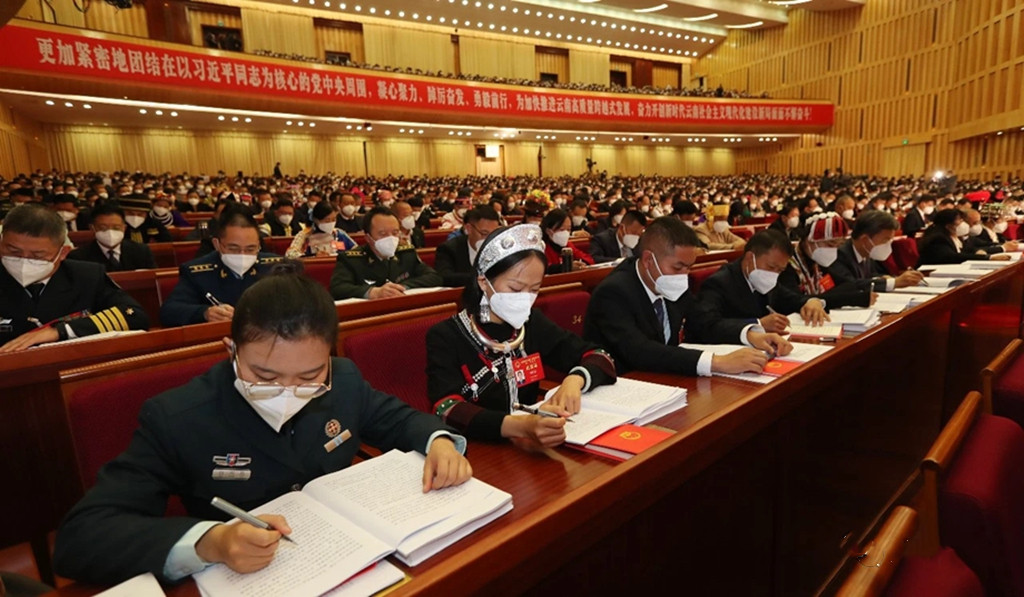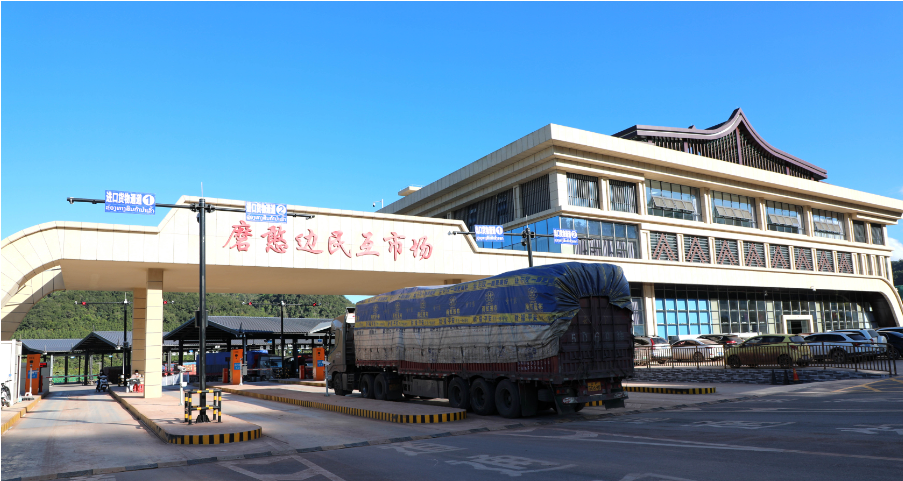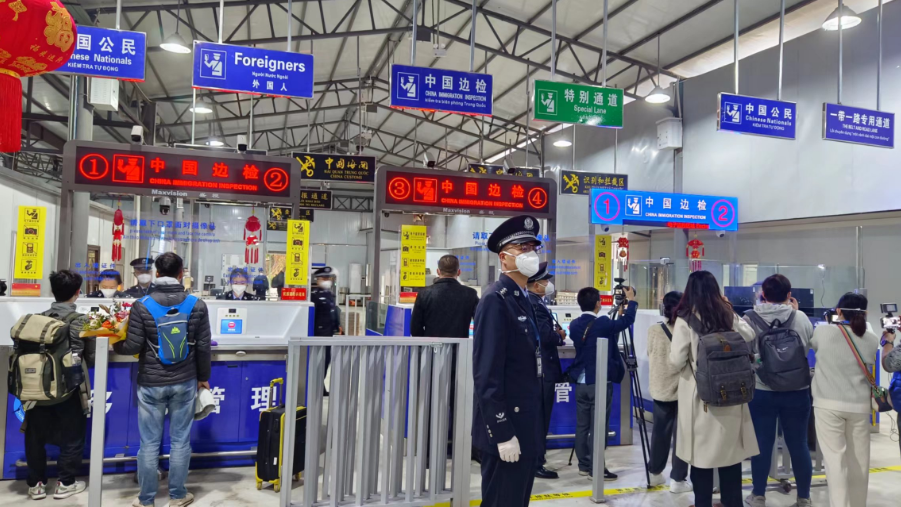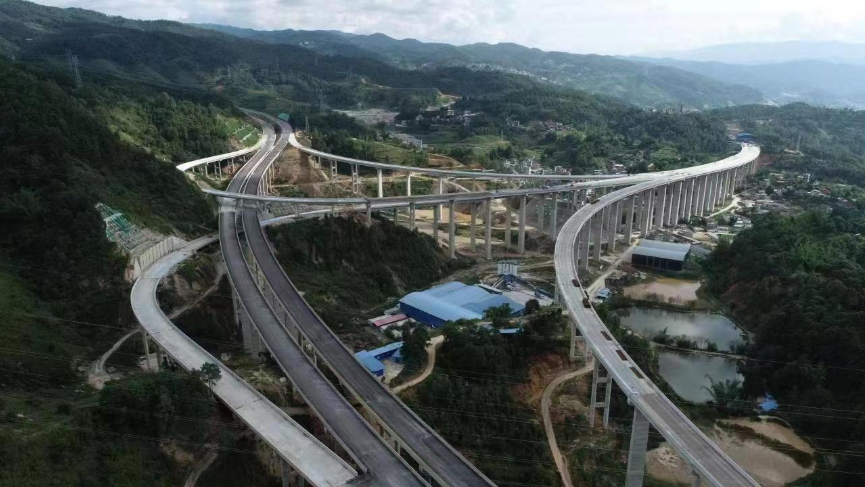Eric's Insight: Port economy to spur Yunnan opening-up
Yunnan province will speed up the development of port economy, increase the trade volume with its trading partners, and make new breakthroughs in high-level opening up, governor Wang Yubo said at the just-concluded first session of the 14th Yunnan Provincial People's Congress, the province’s legislature.

The first session of the 14th Yunnan Provincial People's Congress opens in Kunming, Yunnan province on January 11. Photo/Yunnan Updates
As a province with 20 plus dry ports near the China-Laos, China-Vietnam and China-Myanmar border sections, as well as 15 air ports that operate the most Chinese air routes to south and southeast Asian destinations, Yunnan needs to seriously ponder on the role of ports, and the provincial focus on port economy will add new momentum to local development and opening-up in at least the following two aspects.
First, port economy will create more job opportunities and enhance shared prosperity in the border areas. According to Dacihai, or grand Chinese dictionary, port economy refers to a multi-industry, multi-sector, multi-layer, multi-link and multi-purpose economic system that rests on ports themselves and centers around the flows of cargo, person, capital and information in the port area.
From a traditional perspective, the port is a town or city with a harbor, especially one where ships load and unload goods. It is also where business activities crowd and mega cities rise, be it in China or across the world. For Yunnan, the reality is that most ports are land ports or dry ports, but the conditions for businesses to thrive are similar: voluminous flows of cargo, person, capital and information.
The difference is merely that traditional ports used waterways to finish the flows of cargo and persons, while modern dry ports in Yunnan employ land routes, such as roads and railways to fulfill the flows. Now the major Yunnan ports that connect with Myanmar, Laos and Vietnam are all well-equipped with modern facilities for land transport.

A truck carries cargo for a cross-border market at the Mohan port near the China-Laos border. Photo/Yunnan Daily
As Yunnan kicks off a new round of facility construction for its ports, more job opportunities will be created in the border areas, and with recent reopening of the dry ports of Ruili near the China-Myanmar border, Mohan near the China-Laos border and Hekou near the China-Vietnam border, more cross-border migrant workers from these neighboring countries will come to China for work.
When the new and modern facilities in the border areas are finished and put into operation, the Yunnan ports’ serving capacities will be upgraded, the economic momentum around the ports will be enhanced, and the urbanization drive in the border-gate areas are expected to be quickened. On the whole, Yunnan dry ports will be on the rise as international traffic and business hubs on the China-Indochina peninsular, bringing about common prosperity in tri-junction among China, ASEAN and South Asia.
Shang Labian, deputy to the first session of the 14 Yunnan Provincial People's Congress and deputy secretary of Ruili Municipal Party Committee, said that as the most direct land port connecting China with ASEAN and South Asia, Ruili accounts for over 70% of Yunnan's trade with Myanmar. “Ruili will step up its efforts to be a pivotal and smart port, building up an open economic system based on import, export, processing and trade, with service sectors and infrastructure projects in full swing,” Shang added.
Second, port economy will significantly increase Yunnan’s foreign trade with the neighboring countries, while shoring up people-to-people bonds in the Lancang-Mekong river basin. In the said Chinese dictionary of Dacihai, port economy involves not only infrastructure construction, but also international trade, economic and technological cooperation, tourism-induced trade, service industry, import and export processing industry, export-oriented agriculture, animal husbandry, and more.

The Hekou port near the China-Vietnam border reopens on January 8. Photo/Yunnan Daily
According to the provincial government work report delivered by Wang at the first session of the 14th Yunnan Provincial People's Congress, Yunnan's total import and export volume has increased by 16.3 percent annually in the past five years, with the investment introduced into the province growing by 15.7 percent. Among Yunnan’s trading partners via land routes, the 10 ASEAN nations, the 5 Mekong countries in particular, have been the major ones.
The China-Laos railway was opened to traffic in early 2022, connecting Yunnan’s provincial capital city of Kunming with the Laotian capital Vientiane, and as the line passes through Mohan border town and has a station therein, it has greatly boosted local port economy. Also, the Yunnan expressway sections that link China to Vietnam and Myanmar were completed, adding more economic momentum to the Yunnan ports of Hekou and Ruili. What’s more, the Qingshuihe port near Myanmar will soon be linked up by both expressway and high-speed railway. All the connectivity projects have already facilitated Yunnan’s port economy and international trade.
Through constructing more connectivity facilities and industrial parks around the dry ports, Yunnan will invite in more key links of the industrial chains and investment of major enterprises from both the developed Chinese coastal areas and the neighboring countries, and the province will promote the landing processing of imported goods in border areas, while developing a distinct service economy with well-known brands and transforming its port area from a passing-by economy to an industrial economy.

Construction of an expressway to the Qingshuihe port near the China-Myanmar border is underway. Photo/Yunnan Daily
These actions for economic boost in the port areas will substantially upgrade Yunnan’s caliber in opening-up, giving rise to more cross-border business activities and closer people-to-people bonds in the region. Cross-border tourism will thrive around the Yunnan ports, and so will cross-border markets near Laos, Myanmar and Vietnam.
Xiao Changju, deputy to the just-concluded 1st session of the 14th Yunnan Provincial People's Congress and deputy secretary of Malipo County Party Committee, said that as Yunnan’s second largest land port open to Vietnam, Malipo’s Tianbao dry port has incorporated port economy into its focuses on development. “The RCEP taking effects and the recent China-Vietnam joint statement have expanded the commodity categories for import and export and facilitated the people-to-people exchanges between Yunnan and north Vietnam,” noted Xiao.
The regional and national policy supports for Tianbao and its peers in Yunnan to be emerging port towns seem to have been well-grounded, awaiting for effective provincial actions for port economy.
(The writer Eric Wang Shixue is an English editor with the Mekong News Network based in Kunming, Yunnan province. The view in the article does not necessarily represent that of Yunnan Gateway.)








